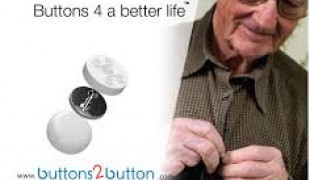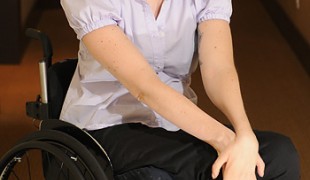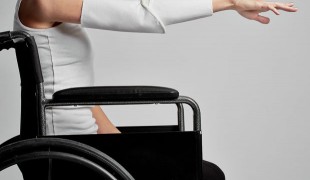- 7058
- 431
- 9
- 16
- 0
- Help Ukraine
About the solution
Brigitta has not thought about commercializing her idea, she simply wanted to create a poncho for her daughter, who uses a wheelchair. But since 2010 the senior woman became an entrepreneur and commercializes Brigitta's Rolljack, ponchos for rainy days, warmer ones as well as cotton capes for winter days.
The ponchos are handmade. In contrast to existing slipping bags, they are easy to put on and off without forcing the disabled patient to move out of his wheelchair, as the ponchos are put on by being pulled over the head, the back part is shortened so that it ends with the seating surface while the front part reaches the feet. The legs are closed with velcro fastener.
“I wanted to create a poncho for my daughter that is practical and beautiful at the same time”, says the woman. Encouraged by the positive feedback of other disabled patients, she improved her hobby.
Meanwhile, home residents in her neighborhood wear these ponchos as well. “The ponchos are helpful for caregivers as well, as they do not have to lift the patients out of their wheelchairs anymore”, explains Brigitta, who is experienced with caregiving for years.
Even though her intent was not to commercialize, the innovator is convinced to have found a gap in the market and therefore, she registered the design. Depending on the design the ponchos cost between 95 to 300 €.
More info: http://www.brigittas-rolljack.de/
Adapted from: http://bit.ly/2oOfNUB
这些解决方案不应包括使用药物,化学品或生物制品(包括食品);创伤性设备;冒犯性的,商业或内在危险的内容。该解决方案未经医学验证。请谨慎进行!如果您有任何疑问,请咨询健康专家。
DISCLAIMER: This story was written by someone who is not the author of the solution, therefore please be advised that, although it was written with the utmost respect for the innovation and the innovator, there can be some incorrect statements. If you find any errors please contact the patient Innovation team via info@patient-innovation.com
-
-
470
-
7
-
7656

Woman creates magnetic buttons to help stepfather who has Parkinson's disease get dressed
(SELF)-CARE: DRESSING: Dressing independently.
Grip
CAREGIVING
Parkinson's Disease
Multiple Sclerosis
Bone Disorders (Decalcification, Bone Deformity, Bone Fracture, Bone Infection)
diabetes type 2
Assistive Daily Life Device (to help ADL)
Body-Worn solutions (Clothing, accessories, shoes, sensors...)
Muscle weakness
Tremors
Difficulty coordinating movements
Stiffness or rigidity (difficulty moving)
Limited range of motion
Muscle pain or stiffness
Loss of balance
Reduced grip force (grip)
Trouble with fine motor skills (e.g., writing, buttoning clothes)
Loss of muscle coordination
Muscle cramps or spasms
Joint deformity
Muscle twitching
Numbness or tingling in the extremities
Joint pain or swelling
Promoting self-management
Managing Neurological Disorders
Promoting inclusivity and social integration
Caregiving Support
Endocrinology
Neurology
Orthopedics
Rheumatology
United States
-
-
-
434
-
0
-
6170

Tetraplegic creates clothing line for disabled people
(SELF)-CARE: DRESSING: Dressing independently.
MOVING IN A WHEELCHAIR: Moving using a wheelchair.
Spinal Cord and Nerve Root Disorders
Cervical spinal cord injury/Tetraplegia
Body-Worn solutions (Clothing, accessories, shoes, sensors...)
Walking Aid (wheelchair/walker/crutches)
Difficulty coordinating movements
Stiffness or rigidity (difficulty moving)
Paralysis of the legs and lower body
Muscle weakness
Promoting self-management
Managing Neurological Disorders
Promoting inclusivity and social integration
Neurology
Orthopedics
Canada
-
-
-
662
-
0
-
9940

Designer creates clothing line for disabled people
(SELF)-CARE: DRESSING: Dressing independently.
MOVING IN A WHEELCHAIR: Moving using a wheelchair.
Hemiplegia
Paralysis
Spinal Cord and Nerve Root Disorders
Muscular Dystrophy
Cerebral Palsy
Body-Worn solutions (Clothing, accessories, shoes, sensors...)
Muscle cramps or spasms
Difficulty coordinating movements
Stiffness or rigidity (difficulty moving)
Paralysis of the legs and lower body
Muscle weakness
Promoting self-management
Promoting inclusivity and social integration
General and Family Medicine
Medical Genetics
Neurology
Orthopedics
Rheumatology
United Kingdom
-
 zh
zh